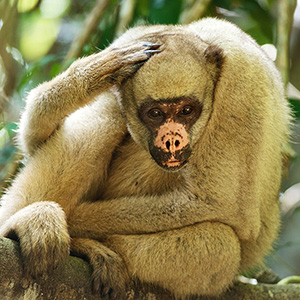Monkey Poop Gives the Scoop
UW researchers look (very) closely at an endangered species.

Scientists combined genetic analysis with long-term behavioral observations to better understand the muriquis’ reproductive patterns. Getty Images
Northern muriquis, which live in the Atlantic Forest of Brazil, are one of the most endangered species of monkey in the world. Choosing good mates and rearing thriving offspring are key to their long-term survival.
To better understand what goes on in the mating lives of muriquis, a group including UW–Madison researchers is turning to the monkeys’ feces. The scientists combined genetic analysis with long-term behavioral observations to better understand the monkeys’ reproductive patterns.
Unlike most primates, muriquis live in peaceful, egalitarian societies, the core of which is made up of related males and their mothers. UW anthropology professor Karen Strier has spent 40 years studying the behavior and ecology of these monkeys in a small, preserved portion of Brazilian forest. She and her team know how to identify each individual monkey and who it is related to. She knows how to tell whose poop is whose. She and her team collected samples as a source of DNA to analyze the muriquis’ mating behavior through genetic data.
“I knew from behavioral observations that there was lack of competition in mating and that mothers didn’t mate with their sons or close male relatives. But the only way to know who the fathers are is with genetics,” Strier says.
Lab analysis confirmed that there were no mother-son pairings, which suggests the muriquis may recognize their kin, allowing them to avoid incestuous mating.
Published in the Winter 2023 issue


Comments
No comments posted yet.